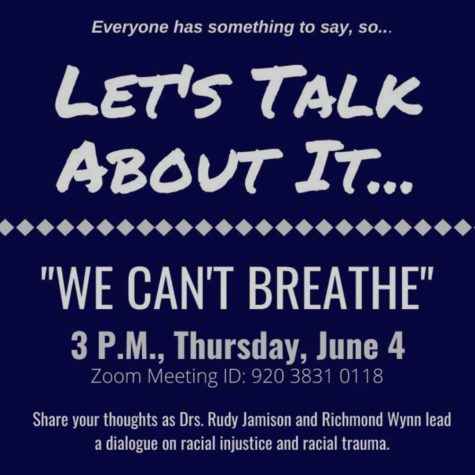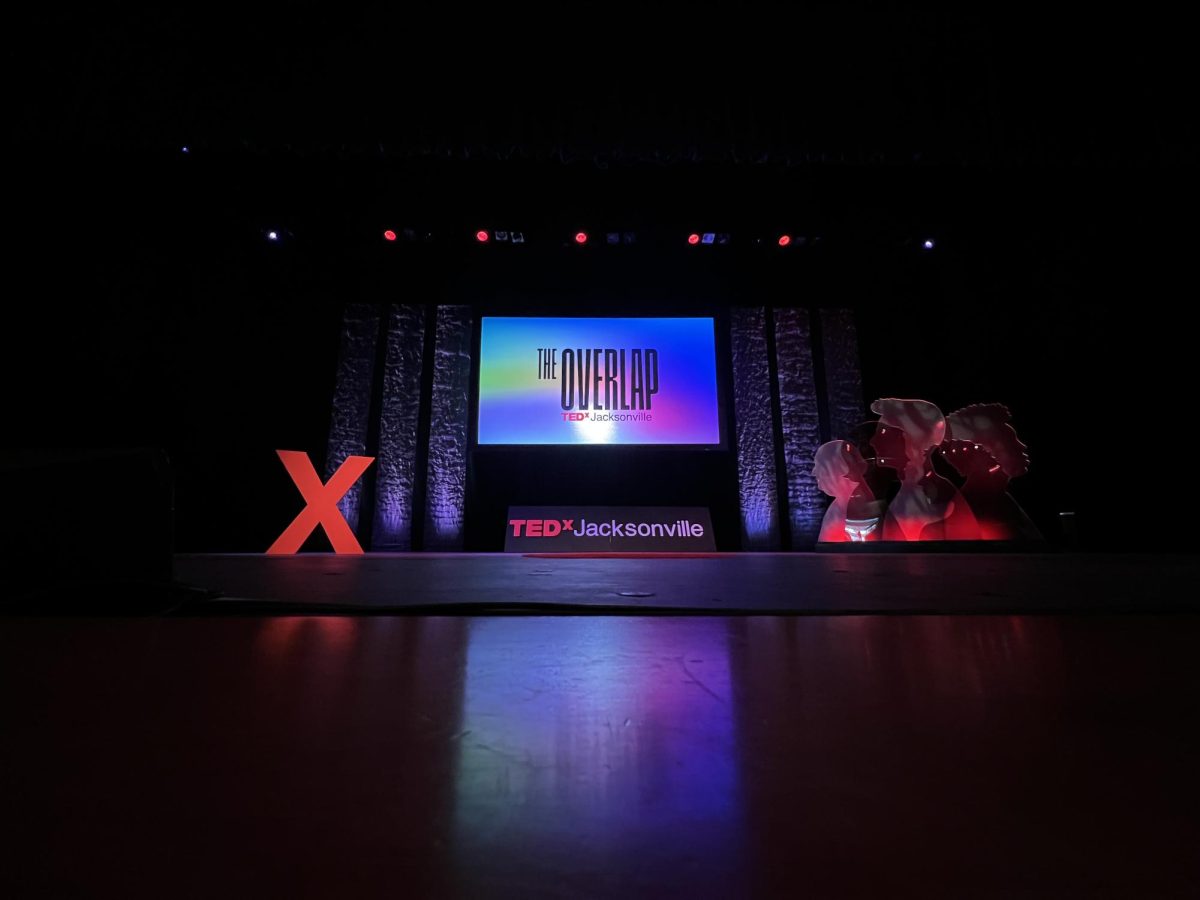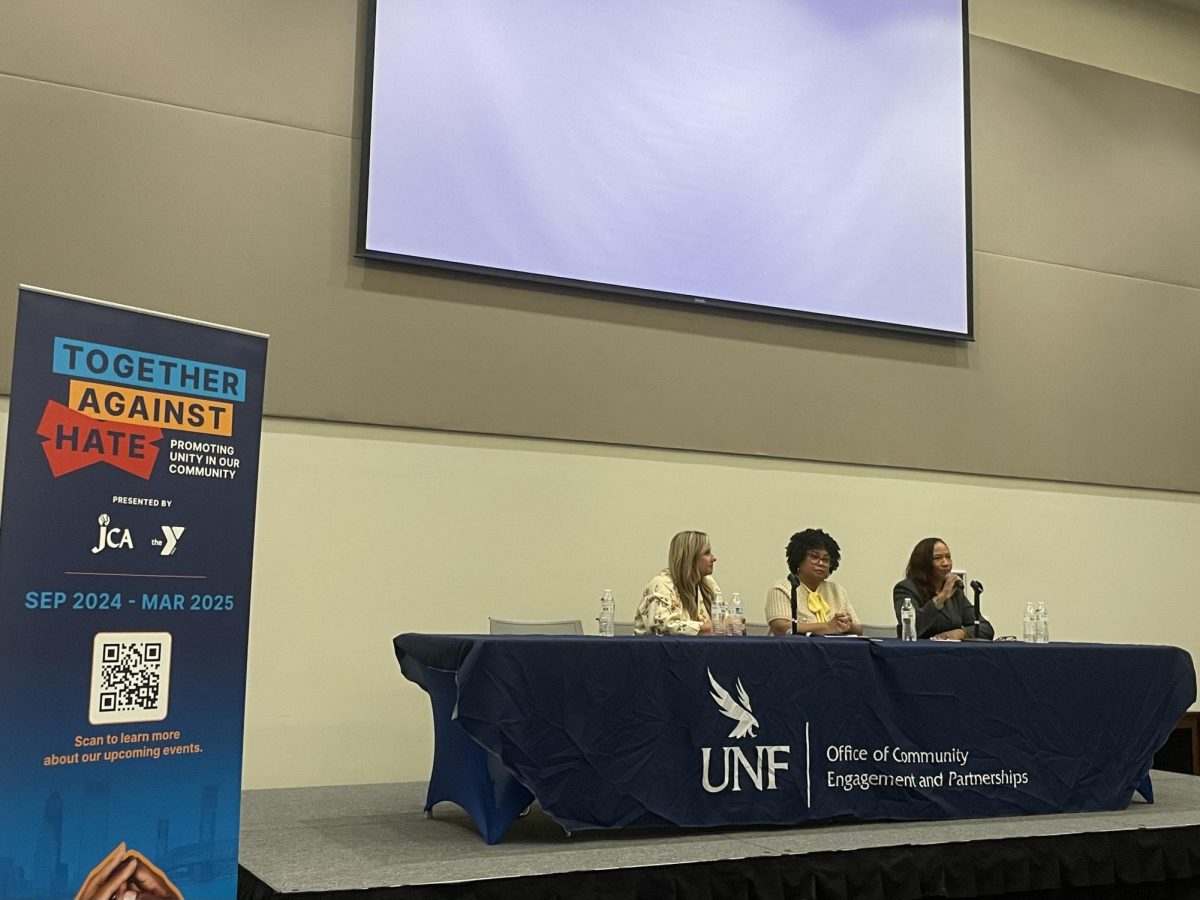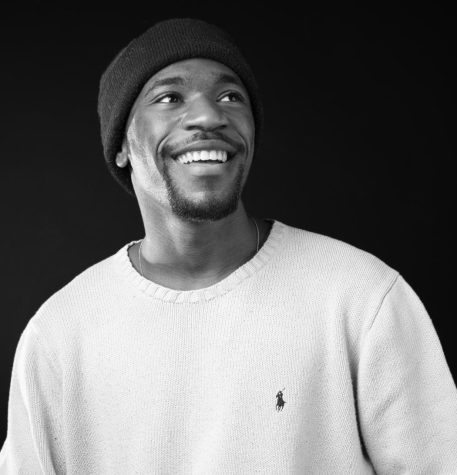Last week, the UNF Women’s Center held a public Zoom meeting where students and faculty could discuss racial injustice and trauma. Dr. Rudy Jamison (The Center for Urban Education and Policies) and Dr. Richmond Wynn (Counseling Center) led the discussion. Part two of the discussion will take place today at 3p.m. on Zoom. You can join with this code: 930-3279-2731.

The President of the Black Student Union, Jennell Berry, prefaced the meeting with some guidelines for the discussion:
- “Use ‘I’ statements. When using an ‘I’ statement, you speak for yourself only. This relieves the speaker from pressure to speak on the behalf of others with similar identities, preludes, or generalizations about people with other identities. Recognize your experience, values, and perspectives are unique.”
- “Understand before responding. Please understand that everybody has a different space and learning journey; therefore please do not try to interrupt while people are speaking,” said Berry.
Sheila Spivey, Senior Director of the Women’s Center, opened the seminar: “Thank you for taking time out of your schedule to join us today. ‘Let’s talk about it’ is a part of a broader series that we have that focuses on trending topics that impact us individually and as a large society. It is unfortunate that we have to create a space to discuss the horrific violent acts that have recently plagued our nation,” Spivey said. “Yet, I’m grateful that you care enough about the topic and you saw this as a space where you can come and support each other as well as come together as a campus community and engage in dialogue. We have knowledgeable and thoughtful leaders with us today who will lead us in dialogue and provide us with some background information.”
Dr. Jamison spoke on racial injustice, referencing some UNF social incidents and sharing part of a chapter from his book. “I appreciate the opportunity to participate in this conversation. I want to thank Sheila and the Women’s Center for creating a space for us to put these issues on the table,” he said.
Dr. Jamison told a story where he spoke to his daughter regarding the recent circulating videos of racial injustice, and asked her: “What does this mean? What do you think it is? What do we do about it?” He said she replied with “I don’t know. I think it’s racism. I don’t think we can do anything about it. We tried millions of times and we can’t do anything about it. Martin Luther King tried, Rosa Parks tried, and Gandhi tried – I just think it’s normal.”
“I don’t think it’s fair for a nine-year-old to see racism as normal,” said Dr. Jamison. “For her sake I am committed to, not only having conversations around this topic, but helping people shift their thoughts and concerns around it. I want to share today a chapter from a book that I ‘co-authored’ with Rodney Lawrence Hurst -who’s a local civil rights icon, in my eyes. […] The title of the book is ‘Never Forget Who You Are: Conversations About Racism and Identity Development.’ […] This particular chapter is titled ‘Racism is Real.’”
Dr. Jamison reads the chapter:
“Racism is real, it’s not just some pseudo-situated reality imagined by a non-white populous. I’ve experienced it all of my entire life. Whether it appears as micro or macro aggressions, racism is real and requires truth and intentionality for its annihilation. Racism is an [inaudible] atmosphere that pressures thought, decision, and behavior -particularly for Black folk. Racism forces Black folk to make a decision, to choose sides, which oftentimes compromises their beliefs and values. The idea that one race is better than another has become an existential absolute -a systematic institution of hegemonic, hierarchical order. For those in lower tiers of this order, overcoming an imperial societal posture means adequately opposing or passively accepting the status quo. As a faculty member and administrator at a predominantly white institution in Northeast Florida, I’ve experienced the insidious potency of race and racism in ways dangerously akin to those of the 1960s.”
Dr. Jamison continues:
“In Fall of 2017, there were several racially motivated incidents that occurred on campus. One of which involved a 37-year-old student who was former Grand Dragon of the Ku Klux Klan, then current Nazi and [inaudible]. This student was a political science major and during a confrontational social media correspondence with Students for a Democratic Society [SDS], a student organization, he posted a topless photo of himself flaunting a swastika tattoo on his chest while holding a rifle and wrote: ‘Let SDS and the other clowns come for me. I will shut them down. Fuck B.L.M. [Black Lives Matter], I am white and proud and those queer-balls have yet to confront me on campus.’ This has been occurred on the heels of a Black Lives Matter rally on campus with a white student snapchatting a video of a group of all white students in a dorm room jumping around like monkeys, captioned: ‘what actually went on at the B.L.M. rally.’ Students involved in this specific incident claim that this was not racist -that it was being blown out of proportion for no reason. The president of the University released regular updates regarding each of these occurrences -ensuring students, faculty and staff that the situation was being addressed and monitored and that safety precautions were being put in place to secure the campus […]. I mention these incidents to illustrate the prevalence of race and racism today as well as to magnify the disconnect between perspectives of differences. […] I believe these events are microcosms of a broader societal spirit and reveal the nature of racism in America and the world today. As much as I would like to be optimistic about racial progress, if I’m honest, I am worried that the illusion of progress and the veil of fertile racist ideas impede the true advancement of equity and equality. Until we admit and unabashedly attempt our part in the institution of racism, we will never progress.”
Dr. Wynn explained, after a collective breath, the causes and symptoms of racial trauma: “I thought I’d share some thoughts about traumatic stress and racial trauma […] using criteria that is used in the Diagnostic and Statistical Manual for diagnosing Post traumatic stress disorder [P.T.S.D.]. One thing that’s important to note is that the Diagnostic and Statistical Manual, or the D.S.M., does not allow for a formal diagnosis of P.T.S.D. due to experiences of discrimination or racism. […] Decades ago, researchers started talking about the fact that exposure to discrimination, exposure to racism in particular, resulted in people experiencing very similar (if not exactly the same) symptoms that are laid out in the Diagnostic and Statistical Manual for diagnosing P.T.S.D. I’m going to follow that up with additional writing about the intersection between race and sexual orientation in the African-American gay man and talk about the combine or the added impact of being in more than one group that is discriminated against. […] There’s quite of bit of research that shows people reporting experiencing some of the following symptoms from racist events that they both have been exposed to directly, and from what we call vicarious exposure -and that is when the person themselves hasn’t personally had the experience, but someone that’s very close to them, someone they know, or people who look like them. I can say for me in this current time, I don’t live in Minneapolis -I don’t have those personal experiences of racism happening to me right now, but just by watching the news, reading stories, and listening to other people talking, some of these symptoms I recognize in myself. That’s the vicarious traumatic experience where it doesn’t have to happen to you directly in order for you to have the experience.”
Here are some of the symptoms that people who have been victims of discrimination can experience, whether they witnessed it or identify with people who have been, according to Dr. Wynn:
Stressors include exposure to trauma, intense feelings of distress when reminded by a traumatic event, and extreme physical reactions to reminders of trauma. That could be nausea, sweating, increased heart-rate, and having or experiencing invasive or upsetting memories of the experiences.
“The way that the DSM talks about it is in relation to one specific event or a couple of specific events. What we’re talking about, here, is exposure to this stress over the course of time -for the most part. For some, it’s difficult to identify where these symptoms are coming from because they’re not related to a car accident or things like that, so it might be hard for people to recognize that they’re actually experiencing traumatic stress,” said Dr. Wynn. “You can have any invasive or upsetting memories that keep showing up even if you don’t want them to about the experience or experiences.”
The symptoms continue: People experience nightmares, loss of interest in life’s daily activities, other difficulties sleeping, feeling emotionally numb and detached, having a sense of not leading a normal life, having difficulty with positivity and optimistic outlooks, avoidance (avoiding any activities, feelings, thoughts, places that remind you of the traumatic experience), and having some memory impairment.
Dr. Wynn also says that change in reactivity could include: Increased aggression, irritability, hyper-vigilance and hyper-awareness, heightened startle-response (That is anxiety which can also lead to depression and other problems, poor coping skills, substance use, and disordered eating), and engaging in risky and destructive behavior.
“I wonder how much of this aggression towards police officers in particular, and aggression towards other people and structures -I wonder how much of this really fits into that category of people experiencing trauma, not feeling heard, and having a compromised ability to think things through cognitively. […] Stress can have a devastating impact on our system, our functioning, and our ability to make rational decisions. While people are going to be held accountable for their own actions, I just think it’s important, for context, to consider what other factors might be contributing to these decisions. […] Researchers have said even though the DSM does not allow us to make a formal diagnosis of P.T.S.D based on racism, people were reporting all of those same symptoms. Despite the fact that we can’t make a formal diagnosis with that cause, we can certainly […]treat them in the same way and approach them in the same way that we would of someone who has P.T.S.D. […] While the experiences we are having today are not the same in terms of the way that people were lynched, and the discrimination and marginilization of Black people [back then], the essence of it is still the same. […] Let’s tune into the systems that have not shifted or changed, or in fact maybe have gotten worse, and the system of marginalization, the system of privilege, the system that would have certain people be on the in-group and others be on the out-group simply because of one characteristic of who they are, that has nothing to do with their character,” concluded Dr. Wynn.
“Thank you Dr. Wynn, you gave us a lot to think about. I know that racial injustice and racial trauma is real. We have had the unfortunate opportunities to see, repeated over and over again through social media and various forms of the media, the lives of Black individuals taken unjustly on numerous occasions over the last several years,” shared Spivey.
Following those statements, students and faculty sprung into facilitated conversation and expressed their feelings on the topic. Over 100 attendees were present in the Zoom meeting and many shared their private thoughts, stories, and experiences. Some participants also attended to learn, understand, and process the events of the past few days.
Very powerful statements were made:
“I have to speak up because I don’t know what it’s like. I’ve had every privilege because I was born this way. I understand that -I’ve always understood that- some people just don’t understand that, and I have to do my part to explain what the difference is. It’s not about crime, it’s about the people who are supposed to protect you. That’s what it comes down to, the people who are supposed to protect you. I don’t know why it’s so hard for people of my color to understand that. […] There are people that get it, and there are people who have hope, and there are people that want to change and it’s my job to make sure that happens in any way I can. […] I coach 31 females from different social and economic backgrounds, different religions, different races, different sexualities and I’ve never seen the response I have now. They want to support, they want to be different, they want to change, so there is hope and we’ve got to remember that we have to keep working and keep trying,” said Coach Faulconer of the UNF Women’s Soccer team.
“The process of processing may take different lengths of time for different people, so be patient with them as they try to do that. […] Some people are still processing, so come back and check on those people even after some time has passed,” said another participant.
The virtual seminar provided a safe place for people to convene, reflect, listen and discuss the current matters of racial injustice. People traded advice and comforted each other, proving that even virtually, we can make a helpful difference to each other.
The inspiring session surely left participants pondering within themselves and left many doing whatever they can to take action against injustice.
___
For more information or news tips, or if you see an error in this story or have any compliments or concerns, contact editor@unfspinnaker.com.
















